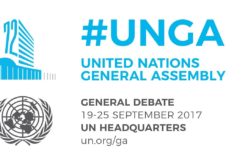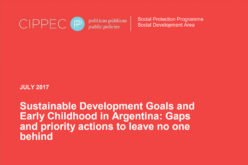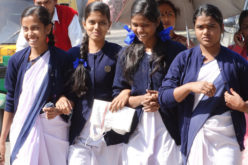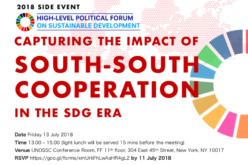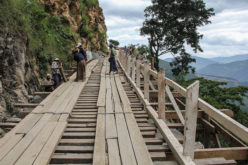Ecuador: Dialogue and Evidence for the success of the Agenda 2030

The initiative ODS Territorio Ecuador contributes to the implementation of the SDGs through the generation of participatory and multi-sector dialogue spaces, citizen observatories and a capacity building programme focused on local actors (public and private sector, and civil society). This initiative is implemented by Fundación Futuro Latinoamericano (FFLA) and Grupo FARO in Ecuador. We interviewed Juan José Herrera from Grupo FARO and Mireya Villacís from FFLA to get some insights on their progress.
SV: We know you have started a new project in Ecuador on the SDGs. Could you tell us briefly about it?
JJH: ODS Territorio Ecuador is a three-year long project, being implemented in five provinces in Ecuador. It comprises three components. First, participatory processes of multi-sectoral dialogue and analysis of the SDGs and their implementation at national and local levels. Second, the creation of one national and five sub-national citizen observatories to monitor the implementation of the SDGs. Third, building the capacity of local authorities and key actors engaged with SDG implementation.
MV: From the implementation of the MDGs we have learned some lessons: we need to increase the participation of different stakeholders, involve local actors with their own needs and solutions, and work at multiple scales/levels. This means taking a top down and bottom up approach. Taking these lessons into account, we put together the expertise of two organisations: FFLA – whose institutional objective is to work towards the achievement of sustainable development through processes of dialogue, participation and capacity building, and FARO with its expertise on monitoring and data analysis. This is how ODS Territorio Ecuador started. The final goal is to improve the quality of life for people in Ecuador through the implementation of the SDGs.
SV: What have you achieved so far?
JJH: We are at the end of the first semester of implementation of the project and so far, the outcomes have been very promising. We have established strong alliances at the local and national levels with municipalities, academia, civil society, public institutions and the private sector.
At the national level, we lead the first Strategic National Dialogue on the SDGs with the presence of high-level decision makers of the most relevant sectors for the implementation of the SDGs in Ecuador. Moreover, we have started the process of prioritising SDGs in 5 provinces of Ecuador through collaborative spaces.
MV: the project has advanced on the process of dissemination and visibility through several research and communication products such as newsletters, infographics, analysis papers, social networks and a dedicated website for the initiative, which has been launched very recently.
SV: You wrote a paper on the early implementation of the SDGs in Ecuador last year. Could you update us on the current status of Ecuador in the implementation of the SDGs?
JJH: Since last year, Ecuador has adopted important actions to advance implementation. For example, the new National Development Plan of the country, which will be launched in the coming weeks, is aligned with the SDGs and will set targets and indicators also aligned with the agenda. Moreover, the legislative will establish a Parliamentary Group to align its laws and other legal frameworks. Finally, the new government is more open to dialogue spaces in the policymaking process. This will allow relevant sectors to engage and contribute to the implementation of SDGs at the national and local level.
MV: Apart from the evident efforts at the level of the national government, it is important to acknowledge the efforts that other sectors of the Ecuadorian society are making towards achieving the SDGs. The private sector, academia, civil society organisations and associations of local governments are starting to implement projects related to the SDGs. There is an important effort at this point to disseminate the SDGs so more people know about them and start getting involved in the process.
SV: What are the main challenges that Ecuador faces now to implement the SDGs?
MV: We can mention a few: little knowledge about the 2030 Agenda and the SDGs especially at local levels, lack of information (qualitative and quantitative), limited resources (financial, technological). However, it is important to highlight the commitment that different actors are showing towards the implementation of the SDGs, which we hope can transform these challenges into opportunities.
JJH: I think one of the main challenges is the articulation of relevant actors. So far, the private sector, public institutions, civil society organisations, academic researchers and international organisations have been working in silos, in an uncoordinated manner. Therefore, the articulation of these actors has become a priority. The other important challenge in Ecuador is finding the means to fund the objectives, the need to measure the implementation of SDGs and the need to translate the goals to the local level.
SV: How do you see your project enabling Ecuador to overcome some of those challenges?
JJH: The project has two main goals. First, to articulate high level actors at the national and local levels from all sectors that are relevant to the SDGs. Second, to establish national and local citizen observatories to develop indicators and reliable information to monitor the implementation of the SDGs in Ecuador. These goals and the specific activities that will be carried out under the project will certainly contribute towards overcoming the challenges of articulation and data generation.
MV: Building on from what Juan José has said, it is important to generate analysis and reflection on the SDGs, their importance, challenges and implications at national and local levels. This informs the decision makers and advocates the inclusion of the SDGs into national and local public policies, while taking into account the different contexts and diversity of the country. That is what we aim to achieve through ODS Territorio Ecuador.
——
Juan Jose Herrera is an economist with knowledge in topics related to extractive industries, energy, sustainable development, climate change and public finance. Extensive experience in the development and coordination of research projects with a legal, economic, social and fiscal focus. Currently works at Grupo FARO.
Mireya Villacís has a Masters in Environmental Policy from Lincoln University, New Zealand. She has more than 10 years of experience as project coordinator and researcher in environmental and social policies, transparency and access to information and participation. Currently works at Fundación Futuro Latinoamericano (FFLA).
2,777 total views, 2 views today


